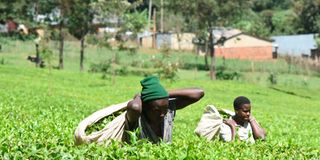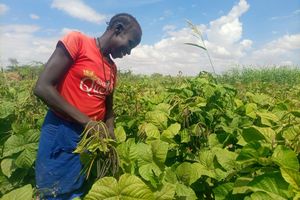Women bear the brunt of climate crisis but offer crucial solutions

Women at a tea farm in Kapsabet, Nandi County.
What you need to know:
- Tackling gender inequalities requires challenging patriarchal norms and power structures that perpetuate the discrimination and marginalisation of women. This involves promoting women's rights and challenging harmful gender stereotypes.
- It also means encouraging women's participation in decision-making processes and incorporating their voices in outcomes.
The climate change discourse often revolves around rising temperatures, extreme weather events and melting ice caps. But in the middle of these conversations lies an overlooked facet: the disproportionate impact of climate change on women.
Gender dynamics permeate every aspect of climate change adaptation and mitigation efforts, from food production to access to resources and land.
It is essential to evaluate the intersection between the climate crisis and gender and, most importantly, address the unique vulnerabilities faced by women.
In many parts of the world, especially in Africa, women play a central role in food production and natural resource management. Ironically, they have limited or no land rights. They also have limited access to or control over technologies needed to adapt to climate change.
As such, they are often excluded from decision-making processes touching on these resources.
This unfortunate situation is a product of gender norms and inequalities that reinforce gendered roles that curtail women's access to and control over resources. The net effect of this is their ability to adapt.
When women are marginalised, their vulnerability to environmental shocks is made worse. This then perpetuates the cycle of poverty and inequality.
Over the years, erratic rainfall patterns, prolonged droughts and other extreme weather events have disrupted agricultural cycles. Agriculture is one of the most devastated development sectors today, putting food security at grave risk.
In developing countries, women are responsible for small-scale farming. Yet they have minimal land tenure rights and financial resources. This curtails their ability to adapt to changing environmental conditions. So, when food production suffers, the whole society starves.
Studies show that when women own and control land, agricultural production yields increase by between 20 and 30 per cent. It is therefore not only archaic to deny land rights to women but also self-defeatist for the continent.
As natural resources such as water grow scarcer due to environmental degradation, women and girls must travel longer distances to collect them. The time and energy spent on these tasks detract from opportunities for education, economic empowerment and participation in community decision-making processes.
This also exposes them to more significant risks of gender-based violence and exploitation. In the end, their exclusion is heightened and their socioeconomic insecurity is deepened.
But none of these comes close to the level of vulnerability to displacement and loss of livelihoods that hurricanes, floods and droughts expose women to. Women face displacement and loss of livelihoods whenever these extreme weather events occur more than their male counterparts. Women also struggle to find evacuation shelters, healthcare facilities and relief assistance.
Women, though, also play a pivotal role in building their communities' resilience and adaptative capacity. Multiple studies show that women are often more attuned to environmental changes. They also possess valuable traditional knowledge and practices for coping with climatic changes.
In Eastern Kenya, for instance, women are producing briquettes to boost their communities' energy security. These briquettes are made from plant residue and other farm waste, emit less fumes than kerosene and are therefore less harmful. They are also cheaper.
In Ethiopia, women have been digging birkas or traditional cisterns that collect and store runoff water for use during the dry season. This prevents them from travelling long distances to get the essential commodity.
To this end, empowering women and promoting gender equality become not only moral imperatives but essential strategies for building resilient communities and mitigating the impacts of climate change.
Efforts to address the interconnection between gender and climate change must be intersectional and holistic, considering women's diverse needs and experiences across different socioeconomic and cultural contexts.
This, therefore, requires urgent integration of gender perspectives into climate policies, programmes and initiatives. This must happen at all levels of governance. Policymakers must also ensure women's meaningful, substantial and active participation in decision-making processes related to climate change adaptation, mitigation and resilience-building.
But even more critical is the need to invest in gender-responsive climate finance mechanisms. This includes providing financial resources and technical support to women-led initiatives that promote sustainable agriculture, renewable energy and natural resource management.
However, tackling gender inequalities requires challenging patriarchal norms and power structures that perpetuate the discrimination and marginalisation of women. This involves promoting women's rights and challenging harmful gender stereotypes.
It also means encouraging women's participation in decision-making processes and incorporating their voices in outcomes.
Ultimately, we must enhance women's access to education, healthcare and economic opportunities to empower them to become agents of change in their communities. This would allow them to contribute substantially to climate solutions and resilience efforts.
By addressing the root causes of gender inequality and investing in women's empowerment through robust climate policies and initiatives, we create more inclusive and climate-resilient communities where all individuals have equal opportunities to thrive.
Gender equality is essential for environmental sustainability and climate resilience. They go hand in hand. When women thrive, humanity and the climate thrive.
Ignatius Juma is an Adaptation and Resilience Associate at Power Shift Africa




